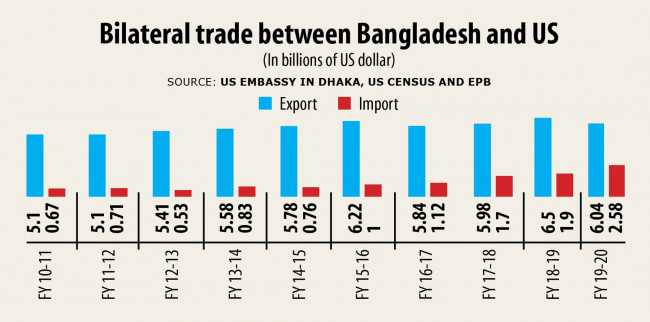Revamp efforts to secure market access, seek more American investment

Image: Collected
Any major trade benefit on the export of goods bound for the US from Bangladesh with the changeover in power is unlikely as Washington rarely alters tariff structures on the import of apparel items.
However, the energy shift may open the entranceway for Dhaka to step up its efforts to secure preferential market access and investment from the US, according to experts and industry leaders.
Their comments came as American voters chose Democrat Joe Biden as the 46th president of the US.
Of the full total shipment to the US from Bangladesh, practically 95 % includes the apparels. However the US government has never slice the import duty on apparels and the garment has remained excluded in the set of the items which may have been granted the Generalised System of Preferences (GSP).
The GSP status for Bangladesh has remained suspended since June 2013 following the nation's deadliest professional incident Rana Plaza building collapse in April 2013 that left 1,138 personnel dead and even more than 2,500 workers injured.
The existing tenure of the US GSP scheme is coming to a finish the following month and unless the Congress renews the preferential trade scheme, Bangladesh would have little opportunity of gaining any extra benefit with the shift of power in the US, the south Asian country's single most significant export destination.
Currently, 120 developing countries and territories are GSP beneficiaries, in line with the US GSP Review Book.
In 2018, products valued at $23.8 billion entered the US duty-free under the programme, out of $238.4 billion worth of total imports from GSP-eligible countries. The US imports from all countries amounted to $2.6 trillion in the year.
Bangladesh's apparel exporters face 15.62 % tariff, one of the best, in the US markets. The speed is far lower for countries like China and Vietnam.
Mustafizur Rahman, a distinguished fellow of the Centre for Policy Dialogue, said Bangladesh may not get any major benefit on the export of garment what to the US because the tariff on the imports is fixed on the most-favoured-nation basis.
Rather, the new Democrat government might impose more stringent conditions on labour and compliance issues practised in Bangladesh.
"Historically, the democrats are always more careful about global human rights, labour rights and compliances in industries set alongside the Republicans."
Bangladesh may seek US investment. The Trump Administration has some reservations on foreign investment by American companies.
"Bangladesh can lobby with US companies to attract investment from major American conglomerates as the Democrat governments are liberal on foreign investment," Rahman said.
Furthermore, Bangladesh can seek supports from the Biden administration at various multilateral forums like the planet Trade Organisation for the extension of the Trade-Related Aspects of Intellectual Property Rights so that the country's pharmaceuticals industry benefits.
So far, the US government has allowed duty-free benefit on apparel imports and then some African countries under the African Growth and Opportunity Act (AGOA).
However, the beneficiary nations are failing woefully to fulfil the expectation on the garment export to the US because they are not strong in apparel manufacturing and don't have enough facilities to produce clothing items according to the demand of American customers.
AK Azad, managing director of Ha-Meem Group, a high local garment exporter, said there could not be any extra benefit because of the change in the administration in the US.
Of his total garment shipment, 90 % are destined to the US. A few of his clients include GAP, American Eagle, JC Penney, Abercrombie and Fitch and VF Asia.
However, if the Biden administration maintains the same policy on China as enforced by the Trump administration, Bangladesh might reap the benefits of shifting of work orders from China, Azad said.
Prior to the Covid-19, local garment manufacturers were acquiring work orders leaving China, but the pandemic stopped the shift.
"A whole lot of major US retailers and brands had contacted me to source more garment items. The pandemic put a halt on their plans. I hope they will revive their plans after the pandemic is over."
Through the fifth round of meeting under the Trade and Investment Forum Agreement (Ticfa) in August, Bangladesh sought more American investment in potential sectors like the pharmaceutical. The issue of reinstating the GSP for certain Bangladeshi products was also raised.
Before the country's GSP status was suspended, Bangladesh shipped products worth $24 million to the US under the preferential trade treatment.
As much as 97 % of the goods of Bangladesh-origin had enjoyed the duty-free usage of the US markets as a least developed country. The country's main export item, garment, had not been contained in the package.
Rubana Huq, president of the Bangladesh Garment Manufacturers and Exporters Association, said: "We can not predict trade predicated on the shift of the US administration.
"We also have to consider the dynamics of the US economy which is going through a slowdown at this moment and the way the second wave of the Covid-19 unfolds in the US."
There could be some shifts in the trade policy between Trump regime and the upcoming Biden administration which might reshape the US trade relationship with China and Vietnam, she said.
"To become more specific, lifting off the punitive tariff imposed by the US on China and reopening of the Trans-Pacific Partnership (TPP) discussions would definitely not be favourable for Bangladesh."
"Yet, the dynamics of China's competitiveness in apparel items and the capability of Vietnam vis-à-vis Bangladesh in the merchandise that people manufacture tilt [the balance] to our favour somewhat."
On the other hand, Huq said, the power shift may equally open the door for Bangladesh to revamp its efforts and lobby in the US for market access since it's been making so a lot of progress in the region of sustainability.
Source: https://www.thedailystar.net